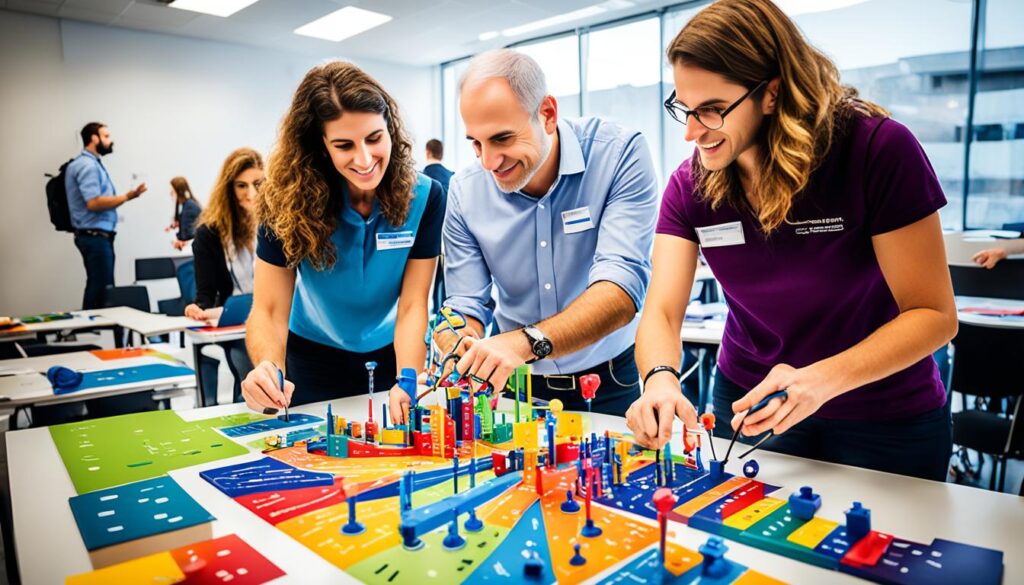“Education is the most powerful weapon which you can use to change the world.” – Nelson Mandela
Welcome to an exploration of the vibrant Israeli academic landscape and the remarkable higher education opportunities it offers. Israel’s commitment to innovation, research excellence, and entrepreneurship has positioned it as a global leader in higher education. By delving into the Israeli model, Sri Lanka can uncover valuable insights on integrating innovation, fostering industry-academia collaboration, and prioritizing entrepreneurial education.
Key Takeaways:
- The Israeli higher education system prioritizes innovation, research excellence, and entrepreneurship.
- Sri Lanka can enhance its higher education landscape by adopting a multidisciplinary approach and promoting inclusivity and diversity.
- Israeli universities actively cultivate an innovation ecosystem and foster industry-academia collaboration.
- Entrepreneurial education equips students with the skills and mindset needed to succeed in the business world.
- Israel’s emphasis on research and development and global collaborations offers international education opportunities.
Innovation Ecosystem in Israeli Higher Education
Israeli higher education institutions have created a thriving innovation ecosystem that fosters cutting-edge research and entrepreneurship. By emulating this model, Sri Lanka can shape a dynamic higher education landscape that fuels innovation. Integrating innovation into the curriculum is a key step towards nurturing a culture of continuous learning and creativity.
Promoting interdisciplinary research is another crucial aspect of building an innovation ecosystem. Encouraging collaboration between different fields of study enables the convergence of ideas from diverse perspectives, leading to groundbreaking discoveries and novel solutions to real-world challenges.
Turning academic research into tangible applications is a hallmark of an effective innovation ecosystem. By encouraging technology transfer and commercialization of research outcomes, universities can bridge the gap between theoretical knowledge and practical implementation. This approach paves the way for the development of market-ready innovations.
Creating collaborative innovation hubs serves as a catalyst for the exchange of ideas and knowledge between academia and industry. These hubs provide a physical space where students, researchers, entrepreneurs, and industry professionals can collaborate, share resources, and collectively contribute to the innovation ecosystem. Fostering stronger ties with industry partners ensures that students gain exposure to real-world challenges, enabling them to develop practical skills and relevant knowledge that aligns with industry needs.
By embracing the Israeli approach to an innovation ecosystem, Sri Lanka can unlock the full potential of its higher education system, nurture local talent, and drive economic growth through entrepreneurship and research excellence.
Industry-Academia Collaboration in Israeli Higher Education
One of the key factors contributing to Israel’s success in innovation is the seamless collaboration between academia and industry. By fostering stronger ties between universities and businesses, Sri Lanka can enhance its higher education landscape and drive economic growth.
Initiatives such as joint research projects provide opportunities for students and faculty to work together with industry professionals, gaining valuable real-world experience and insights. Industry placements for students enable them to apply their theoretical knowledge in practical settings, developing skills that are highly sought after by employers.
Collaborative innovation hubs serve as platforms for interdisciplinary collaboration, bringing together experts from academia and industry to solve complex problems and drive innovation. These hubs provide a fertile ground for knowledge exchange, mentoring, and networking, facilitating the translation of research into tangible products, services, and solutions.

By promoting industry-academia collaboration, Sri Lanka can bridge the gap between theoretical knowledge and practical application, equipping students with the skills they need to thrive in the workforce. Collaboration between universities and businesses fosters an environment of innovation, entrepreneurship, and knowledge transfer, creating a win-win scenario for both academia and industry.
- Joint research projects
- Industry placements for students
- Collaborative innovation hubs
Implementing these initiatives will not only benefit individual students and institutions but also contribute to the overall economic development and competitiveness of Sri Lanka.
Entrepreneurial Education in Israeli Higher Education
Israeli universities prioritize entrepreneurial education, equipping students with the skills and mindset needed to navigate the business world. To emulate this success, Sri Lanka can integrate entrepreneurial education into its higher education system by incorporating courses on business development, startup management, and innovation. By providing students with a solid foundation in entrepreneurship, Sri Lanka can empower them to become leaders in the dynamic and competitive global market.
One effective way to foster entrepreneurial education is through the establishment of entrepreneurship centers within universities. These centers can serve as hubs for innovation, providing students with resources, mentorship, and networking opportunities. By connecting students with experienced entrepreneurs and industry professionals, these centers can bridge the gap between theory and practice, nurturing a culture of innovation and enterprise.
In addition to specialized courses and entrepreneurship centers, mentorship programs can play a vital role in entrepreneurial education. Pairing students with successful entrepreneurs or business leaders can provide valuable guidance, inspiration, and real-world insights. These mentorship programs offer students the opportunity to learn from experienced professionals, build connections, and gain practical knowledge that complements their academic studies.
Furthermore, incorporating practical projects and experiential learning opportunities into the curriculum can immerse students in real-world entrepreneurial scenarios. Collaborative projects, internships, and business simulations can expose students to the challenges and complexities of running a business, enhancing their problem-solving skills and fostering an entrepreneurial mindset.
Nurturing the Next Generation of Entrepreneurs
Integrating entrepreneurial education into the higher education system is crucial for Sri Lanka’s economic growth and innovation ecosystem. By equipping students with the tools, knowledge, and mindset needed to identify and seize entrepreneurial opportunities, Sri Lanka can cultivate a new generation of innovative and resilient entrepreneurs.
The image below showcases the entrepreneurial spirit and drive that Israeli higher education instills in its students:

Through a comprehensive approach to entrepreneurial education, Sri Lanka can foster a culture of innovation, creativity, and entrepreneurship, driving economic growth and positioning itself as a hub for entrepreneurial excellence.
Research and Development (R&D) Focus in Israeli Higher Education
Israel’s commitment to research and development (R&D) is a cornerstone of its higher education system. With a significant allocation of their budget towards R&D, Israeli universities have been instrumental in groundbreaking discoveries and technological advancements. Sri Lanka has the opportunity to enhance its own research capabilities by following Israel’s lead.
To foster a research-oriented culture within universities, Sri Lanka can increase investment in R&D. By providing ample resources and incentives for faculty and students to engage in impactful research projects, Sri Lankan universities can become hotbeds of innovation and contribute to national development.
Collaboration with industry partners and international research networks is another avenue that Sri Lanka can explore to amplify the impact of its R&D initiatives. Establishing strong partnerships with industries can provide the necessary support and funding for research projects. Additionally, joining international research networks can facilitate knowledge exchange and foster collaborative research efforts.

By adopting Israel’s emphasis on R&D, Sri Lanka can drive innovation, push the boundaries of knowledge, and contribute to socioeconomic growth. Investing in research and forging partnerships will position Sri Lankan universities at the forefront of discovery, generating solutions to global challenges and paving the way for a prosperous future.
Globalization and Internationalization in Israeli Higher Education
Israeli higher education institutions are at the forefront of embracing globalization and internationalization, creating a vibrant and diverse academic environment that attracts students from around the world. By studying in Israel, you can expose yourself to a multicultural community of learners and tap into a global network of opportunities.
One of the key strategies Sri Lanka can adopt to enhance its global presence is by attracting international students. Just as Israeli universities have successfully attracted students from diverse backgrounds, Sri Lanka can implement effective marketing and recruitment strategies to draw students from across the globe. By doing so, Sri Lanka can enrich its campuses with a mix of cultures, languages, and perspectives, fostering a global learning experience for all.

Fostering Faculty Exchanges
In addition to attracting international students, Sri Lanka can also promote faculty exchanges as a means of fostering internationalization in its higher education institutions. By inviting professors and researchers from abroad to teach or collaborate on joint projects, Sri Lankan universities can benefit from diverse expertise, cross-cultural learning, and the exchange of innovative ideas. These collaborations can lead to new academic partnerships and research opportunities, further enhancing the international reputation of Sri Lankan higher education.
Participating in Joint Research Initiatives
Joint research initiatives provide another avenue for internationalization in higher education. Sri Lanka can actively seek partnerships with universities worldwide to collaborate on research projects of mutual interest. Such collaborations enable the sharing of resources, knowledge, and expertise, ultimately leading to groundbreaking discoveries and innovations. By participating in these joint research initiatives, Sri Lankan universities can contribute to the global academic community and establish themselves as key players in international research collaborations.
In conclusion, embracing globalization and internationalization is crucial for Sri Lankan higher education institutions to thrive in the global knowledge economy. By attracting international students, fostering faculty exchanges, and participating in joint research initiatives, Sri Lanka can position itself as a hub for international collaboration and provide students and faculty with a truly global educational experience.
Multidisciplinary Approach in Israeli Higher Education
Israeli higher education institutions are renowned for their emphasis on a multidisciplinary approach, offering students the opportunity to explore diverse fields of study. This unique educational approach encourages cross-disciplinary collaboration, fostering innovative thinking and problem-solving skills.
By adopting a similar approach, Sri Lanka can revolutionize its higher education system. By offering interdisciplinary programs that transcend traditional academic boundaries, Sri Lankan universities can empower students to gain a comprehensive understanding of various subjects and develop a versatile skillset.
This multidisciplinary approach not only broadens students’ perspectives but also meets the evolving needs of industries that value professionals with diverse skill sets. The ability to apply knowledge and expertise across different disciplines is highly sought after in today’s rapidly changing job market.
For example, imagine a student pursuing a degree in computer science who also studies business management. This combination of skills enables them to develop innovative technology solutions while understanding the business aspects required for successful implementation. With a multidisciplinary background, graduates are better equipped to tackle real-world challenges and contribute to the growth and transformation of industries.
Benefits of Multidisciplinary Education:
- Enhanced problem-solving abilities through the synthesis of knowledge from various disciplines.
- Increased adaptability and resilience in a rapidly changing workforce.
- Improved communication and collaboration skills by working with individuals from different disciplines.
- Broader career opportunities by possessing a versatile skillset applicable to multiple industries.
- Increased creativity and innovation through the integration of diverse perspectives.
Sri Lanka has the opportunity to embrace the multidisciplinary approach practiced by Israeli higher education institutions. By encouraging students to pursue interdisciplinary studies, Sri Lankan universities can nurture well-rounded professionals who are prepared to thrive in the dynamic global landscape.
Implementing a multidisciplinary approach in Sri Lankan higher education will require collaboration between academic departments, curriculum redesign, and the development of interdisciplinary research centers. By embracing this innovative model, Sri Lanka can create a generation of graduates who possess the skills and knowledge required to make a significant impact across various fields and industries.
Quality Assurance Mechanisms in Israeli Higher Education
Israel’s higher education institutions have set up robust quality assurance mechanisms to ensure the maintenance of high standards in education. To enhance the quality of education in Sri Lanka, it is essential to strengthen accreditation processes, implement rigorous quality benchmarks, and introduce regular evaluations.
By improving the transparency of assessment mechanisms, Sri Lankan degrees can gain global recognition and credibility. Accreditation processes should be rigorous and comprehensive, focusing on evaluating the quality of curriculum, faculty, facilities, and learning outcomes.
Regular evaluations and reviews of higher education institutions will enable continuous improvement and ensure that the educational programs meet the required standards. Quality assurance bodies should establish clear guidelines and benchmarks that institutions need to meet to maintain their accreditation.
Furthermore, sharing best practices and fostering collaboration among universities will contribute to the ongoing enhancement of quality assurance mechanisms. Knowledge sharing platforms can be established to encourage universities to learn from each other’s experiences and implement effective quality assurance practices.
The image below illustrates the importance of quality assurance mechanisms in Israeli higher education:
Implementing robust quality assurance mechanisms is a crucial step towards ensuring that the standards of Sri Lankan higher education align with international benchmarks. By doing so, Sri Lanka can establish a reputation for delivering quality education that prepares students for successful careers in a globalized world.
Inclusivity and Diversity in Israeli Higher Education
Israeli universities prioritize inclusivity and diversity, creating an environment where students from various backgrounds feel welcome and valued. This commitment to inclusivity enhances the overall educational experience and fosters a culture of respect and understanding.
By implementing policies that ensure equal access to education, Sri Lanka can also promote inclusivity in its higher education system. Ensuring that students from all walks of life have equal opportunities to pursue their academic goals is essential for a fair and just society.
In addition to policies, fostering a culture of diversity on campuses is crucial. Sri Lankan universities can actively encourage students from different ethnicities, religions, and socioeconomic backgrounds to come together and learn from each other’s perspectives. This exposure to diverse viewpoints cultivates well-rounded individuals who are equipped to thrive in an increasingly interconnected world.
Moreover, providing support systems for underrepresented groups is vital in creating an inclusive environment. Sri Lanka can establish initiatives and resources that cater to the needs of minority students, students with disabilities, and marginalized communities. By offering targeted support, universities can ensure that every student has an equal opportunity to excel academically and personally.
A diverse and inclusive educational environment also enhances critical thinking and creativity. When students from different backgrounds come together, they bring unique perspectives, ideas, and experiences to the table. This diversity of thought stimulates innovation, encourages collaboration, and broadens the horizons of all students.
By embracing inclusivity and diversity, Sri Lanka can create a higher education landscape that celebrates the richness of its society and prepares students for a globalized world. Through collaborative efforts, universities can foster an environment where every student feels valued and empowered to reach their full potential.
Conclusion
The Israeli academic landscape offers a multitude of higher education opportunities that are specifically designed to foster academic growth and career success. By taking inspiration from Israel’s model, Sri Lanka has the potential to revolutionize its higher education system, incorporating innovative approaches and creating a platform for continuous learning and employment opportunities.
One key area of focus for Sri Lanka should be fostering stronger industry-academia collaboration. By bridging the gap between theoretical knowledge and real-world application, Sri Lankan universities can equip their students with the necessary skills and experience to excel in the workforce. Promoting entrepreneurship education is also crucial, as it cultivates an entrepreneurial mindset and provides students with the tools to navigate the business world.
To enhance the higher education landscape, Sri Lanka should also prioritize research and development. By investing in R&D and creating a research-oriented culture, the country can contribute to groundbreaking discoveries and technological advancements. Embracing globalization and internationalization, adopting a multidisciplinary approach, strengthening quality assurance mechanisms, and promoting inclusivity and diversity are further steps that Sri Lanka can take to elevate its higher education system.
Source Links
- https://www.linkedin.com/pulse/transformative-insights-from-israels-higher-education-koralage-odo2c
- https://digitalcommons.wku.edu/cgi/viewcontent.cgi?article=1047&context=ijlc
- https://international.tau.ac.il/eli-gap-year


